The recent political hubbub surrounding tariffs and trade wars has focused a lot of attention on manufacturers that still make products in the U.S.A. Tune in to just about any nightly business show, and you’ll hear stories about brands that are doing their best to keep business — and jobs — here at home while facing up to the many challenges that present themselves in today’s (multi-national) environment. One of those companies is an exuberant denim brand called Raleigh Denim Workshop, founded in (where else?) Raleigh, North Carolina, in 2007 by Sarah Yarborough and Victor Lytvinenko.
Like many entrepreneurs, they were just looking for the product that fit their definition of perfect: in this case, the perfect pair of jeans. We recently had a chance to catch up with Victor Lytvinenko to hear about Raleigh Denim’s passion for experimentation, as well as about its ongoing collaboration with contemporary furniture masters Bernhardt Design.
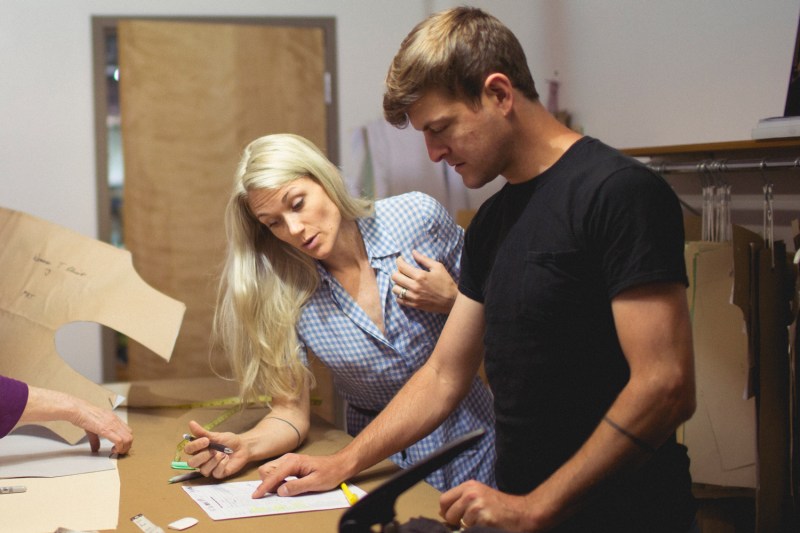
Since its founding, Raleigh Denim Workshop has established itself with a focus on quality over quantity. Sarah and Victor built a facility that is more like a true designer’s atelier than a factory. In fact, The Curatory is both a workshop and retail outlet. Located in Raleigh’s warehouse district, customers can shop for Raleigh Denim — as well as other brands that share its creative DNA — while peeking at the manufacturing process (assuming you’re there during working hours).
“The ceiling of the store is covered with 5,000 paper airplanes,” says Victor. “It immediately sets up a sense of wonder when people come in. You can hear the machines running when you walk in the door, and then walk over and actually see them in operation through a window.”
Fitting Denim for Classic Fits
Raleigh Denim’s men’s core collection includes four classic fits, from a thin taper to a more relaxed “work” fit; available in a variety of fabrics that will make even the most hard-core denim head swoon. Choose from raw, selvedge, and, perhaps most exotic, limited-edition denims that include the last of United States-made Cone Mills’ product, loomed before the company closed its Greensboro, North Carolina, White Oak mill in 2017. Raleigh also works with Huston Textile, a veteran-owned, family-operated textile mill that Victor describes as “started by a guy working out of his garage in California.” (Huston now operates from a converted military hangar near Sacramento, utilizing a dozen vintage textile looms.) Raleigh Denim also experiments with denim, like a sustainable version that comes from a Japanese mill and uses banana fibers. Other offerings include colorful canvas styles, stretch fabric jeans, baby-soft flannel plaid shirts, and the company’s own interpretation of classic Oxford shirts.
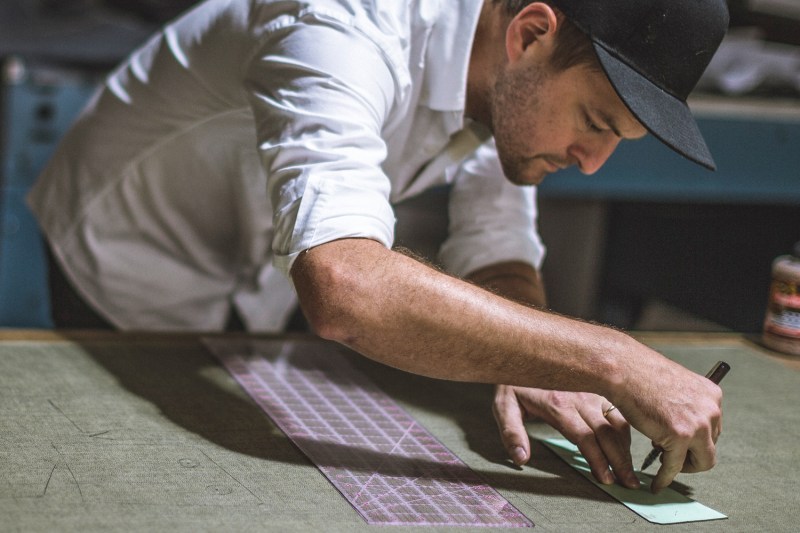
Raleigh Denim has a loyal fan base, and dresses celebrities like Brad Pitt, indie performer Justin Vernon, rapper J. Cole, and football player, actor, and furniture designer Terry Crews. The collection is carried in specialty stores, as well as some department stores.
Feeding the Creative Machine
Staying true to the “Workshop” in its name, the founders have always looked at Raleigh Denim as a laboratory for experimentation. “The line keeps growing from prototypes that Sarah and I sew up,” Victor says.
“My friend Zalman Raffael is the artistic director of the North Carolina Ballet. He really wanted a three-quarter length jacket — this was like a couture idea — so we collaborated on that project and now, well, let’s just say you may be seeing something like that in an upcoming collection.”
Earlier this year, the duo introduced a new collection they’re calling “1/1.” It’s described as “a forum for creating beyond the parameters of a conventional collection,” says Victor. “They are one-of-a-kind pieces that are handmade and signed by either Sarah or me. Recently we made nautical flag quilts, and are auctioning them on our website. The proceeds are donated to an environmental defense fund. Sarah sometimes even makes stuffed animals.” (Editor’s note: risking their relationship, Victor shared some images with me of Sarah test-dying leather straps for a would-be collection of belts in their backyard indigo vats. We’re hoping they’ll be available on the website, soon.)
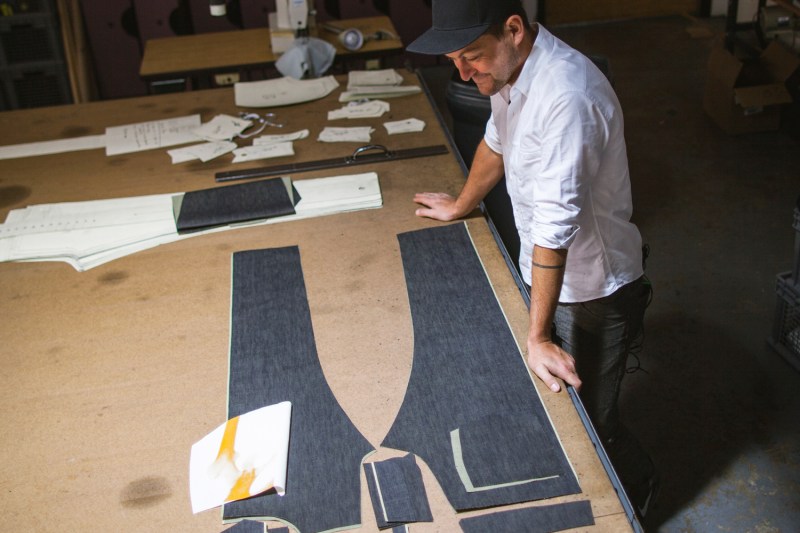
Creating these one-offs is just one way that the couple feeds the creative beast. Another friend, An Nguyen of Durham, N.C., is the founder and head goldsmith of Atelier N Fine Jewelry. Nguyen is working with Victor on a unique pair of jeans where the buttons and rivets will be made from solid rose gold.
Raleigh Denim also launched a collaboration with Bleu De Chauffe, a French company, in the summer of 2019. Victor describes it as a “sister factory” because of its commitment to artisanal techniques and its location in Aveyron, a mountainous section in the South of France. Bleu makes handmade bags and accessories, so the collaboration resulted in the Remix bag, a gender neutral tote featuring some of that raw Cone Mills denim and vegetable-tanned leather. At $445, the limited edition bag sold out through pre-orders within a month after it went on sale.
Furnishing Spirit
A whole new venue for creative expression was opened to the couple when they met Jerry Helling, president of renowned contemporary furniture manufacturer Bernhardt Design. “I was into making furniture when I was in college, so this was an amazing opportunity” says Victor. “Helling started by asking what our actual work table meant to us. We started from there, and, before long, showed our first pieces at Wanted Design (a New York City design trade event). We were making jeans right there, on the tables. It sold like crazy, and then two years later we added a textile collection. Later they came to us to add an office furniture collection, so we asked Helling what he wanted. He said, ‘Victor, just send us beautiful things.’” Victor says that Helling collects people the way some people collect, well, blue jeans. “Terry Crews also designs a collection for Bernhardt!”
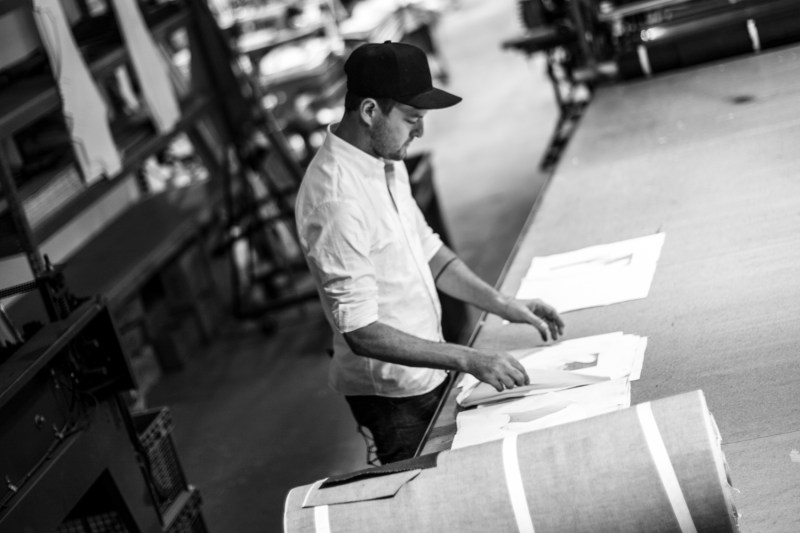
The Blueprint by Raleigh Denim furniture collection is, of course, designed to “foster innovation through adaptable design.” It includes everything from meeting and cafe tables, to chairs and storage units. They are designed for the kind of communal work environment that Sarah and Victor encourage in their own workshop. Each provides several options for integrated power devices; with table, counter, or bar heights available. Simple, almost playful, upholstered pieces and office chairs have a decidedly mid-century modern meets workbench aesthetic. The Looking Up textile collection includes patterns reminiscent of stars, supernovas, kaleidoscope patterns, and, of course, paper airplanes; all on colorful, textured fabrics.
In Store for More
While customers are invited to stop by The Curatory anytime, the store/clubhouse is also a local hub for parties, and includes a piano for concerts and plenty of space for informal dinners. The shop recently partnered with local crafters Fullsteam Brewery for in-store happy hours while hosting block parties during Raleigh’s Hopscotch Music Festival. (Next year, sign us up for Hopscotch Hangover Bloody Marys at the shop on Sunday, the day after the festival closes.)
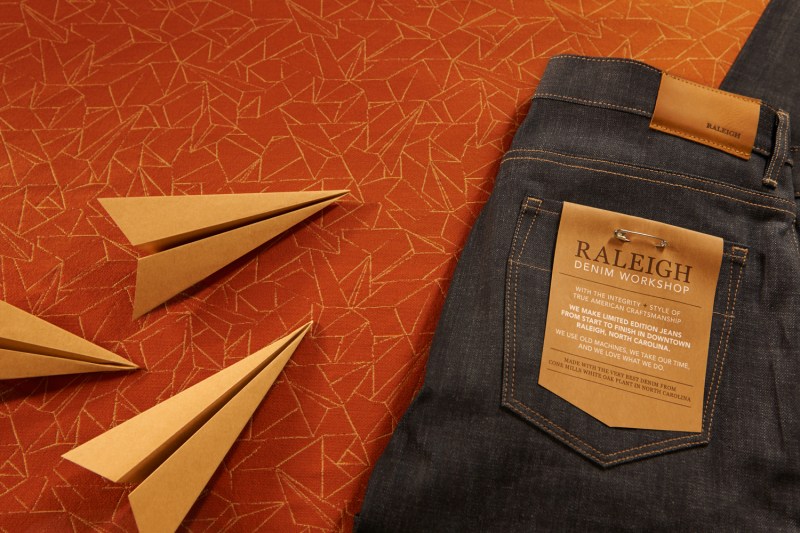
Lytvinenko points out that while the company’s current product mix is in the $250 to $350 ballpark, he’d certainly like to see opportunities where they could delve into the $150 to $175 range without sacrificing the high standards the team espouses. Since the creative duo got their start by sitting in front of a sewing machine and taking matters into their own hands, we can only wait to see in what other ways they’ll be enriching our wardrobes — and lives — for Fall 2019, and seasons to come.


